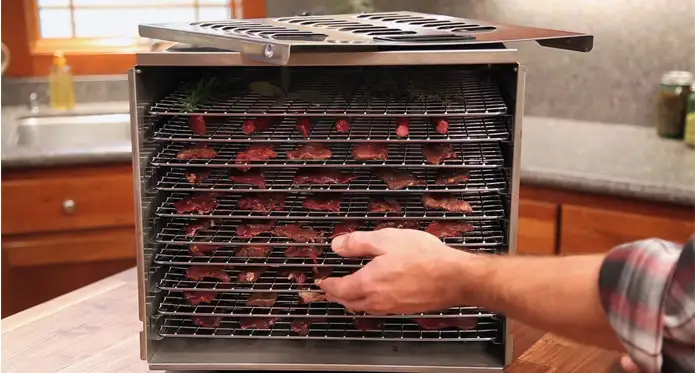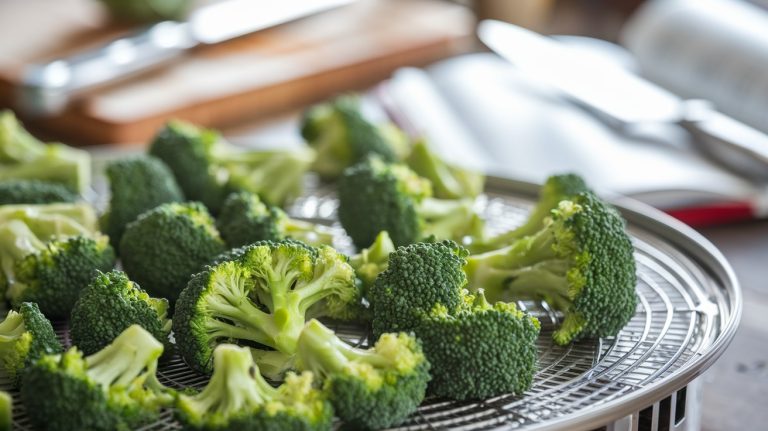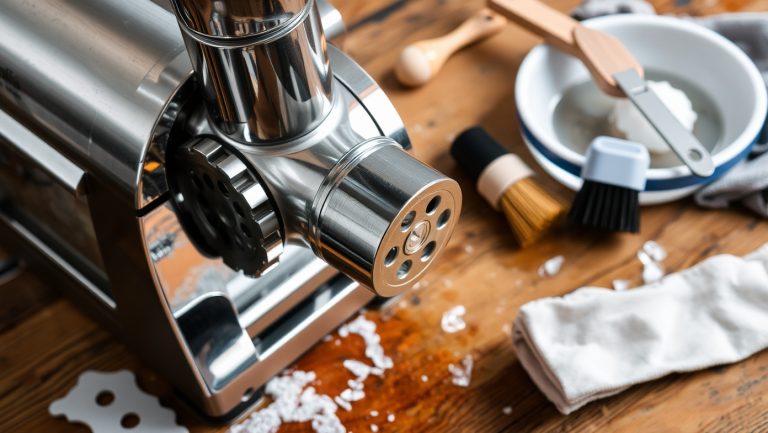Is it Safe to Leave a Food Dehydrator on Overnight [Answered]
Food dehydrators are a very effective way to preserve food since dehydrated foods last far longer than fresh foods because the water is removed. But some people are worried about leaving their dehydrator on overnight.
Even though dehydrators use heat to remove wetness from food, in terms of food safety, is it safe to leave a food dehydrator on overnight? A food dehydrator might be equipped with features such as automatic shut-off and temperature control that prevent overheating, so food dehydrates safely and efficiently.
Also, dehydrators are made with durable materials that can be used for a long time. Please continue reading to understand food dehydrators’ safety and how to leave them on overnight for dehydrating food.
Is it Safe to Leave a Food Dehydrator On Overnight?
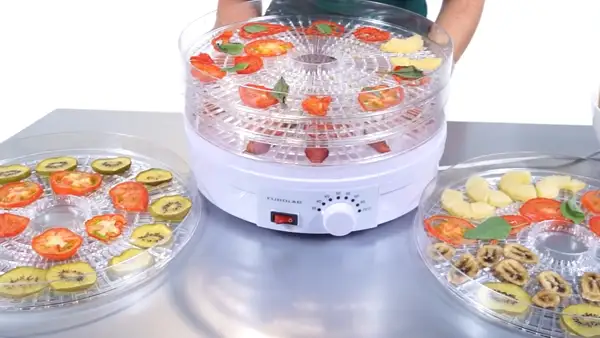
Leaving a food dehydrator power on overnight is no problem as long as the dehydrator is in a ventilated area, away from any flammable objects, and not covered.
Concerned about electrical safety, ensure the cord isn’t frayed and that the unit doesn’t show any damage. Some people like to put their dehydrator in a closet or on a countertop where it’s out of the way.
If you do this, just leave the door open so that air can circulate. Dehydrators need airflow to work correctly. If you have your electric dehydrator in an enclosed space, there is a chance your food won’t dry completely, and it could start to spoil.
So, leaving the door open or putting it in a well-ventilated area is best. Then, you can relax and let your dehydrator do its job.
The Consequences of Dehydrating Food Over Time
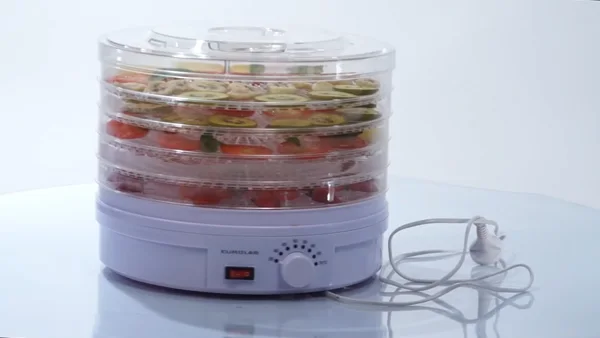
Dehydrating food is a popular way to preserve it for later use, but many people don’t realize that over-dehydration can have serious consequences. Not only does over dehydration change the physical appearance of food, making it crumbly and small, but it can also alter the flavor and texture.
In some cases, over-dehydrated fruit & food can even develop an unpleasant smell. But, the most dangerous consequence of dehydration is that it makes food much more susceptible to spoilage and bacteria growth.
Another consequence of drying food is that it shrinks significantly in size. This is due to the loss of water weight and can make the food much less filling than usual.
When food is dehydrated, water is removed, meaning there is less of an environment for bacteria to thrive in. But, if food is over-dehydrated, bacteria can start to grow, leading to food poisoning. For this reason, it’s important to dehydrate food properly to avoid these consequences.
What are the Advantages of Dehydrating Food Overnight?
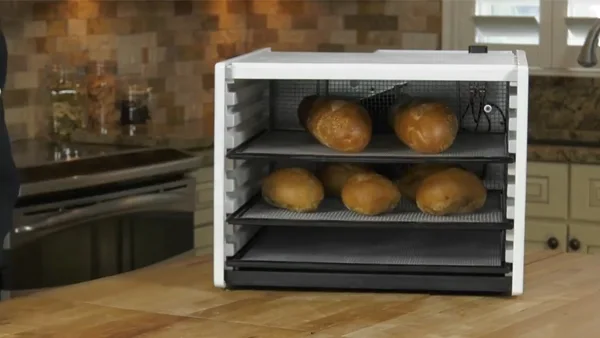
Dehydrating food extends its shelf life and preserves its nutrients. Food can be preserved for months or even years without deteriorating. The main benefit of dehydrating food is that it removes the water content, where bacteria and mold can live. By doing this, you’ll reduce your chance of getting food poisoning.
It’s also easier to store and transport dehydrated food since it’s lighter and takes up less space. Also, dry foods are much lighter and more compact than their fresh counterparts, making them ideal for backpackers and travelers.
Dehydrated food retains most of its original flavor and texture, so it’s great for people who enjoy cooking. The other great thing about dehydrating food overnight is that it’s easy. Just put your food in a dehydrator before bed, and you’ll have delicious, healthy snacks in the morning.
And because dehydrated foods have had most of their water removed, they typically require less energy to digest, which can be helpful for people trying to lose weight. As a bonus, some dehydrated foods have a richer flavor than fresh foods because dehydration concentrates the sugars and flavors.
Can Dehydrators Overheat for Prolonged Use?
Dehydrators are a convenient way to preserve food, but like any electrical appliance, they might come with some risks. Although most dehydrators have built-in safety features that shut off the unit if it gets too hot, prolonged use can still lead to overheating.
When dehydrators overheat, they can damage the heating elements and cause fires. For this reason, it’s essential to keep an eye on your stackable dehydrator while it’s in use and to heed any warning signs that it may be overheating.
If you notice the unit starting to smoke or smell strange, turn it off immediately and unplug it from the outlet. Once it has cooled down, inspect the heating element for damage. If there is any damage, replace the component before using the dehydrator again.
How Long Does it Take to Dehydrate Food in a Dehydrator?
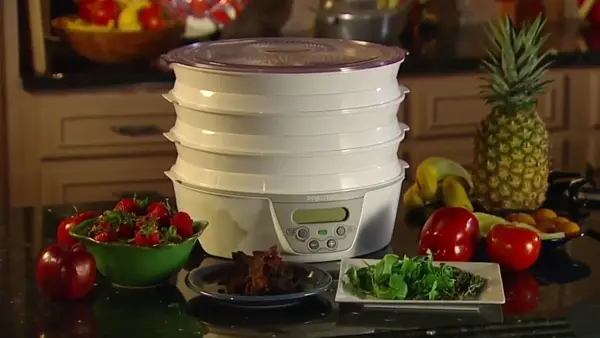
Dehydrators work by blowing hot air over the food, causing the water content to evaporate. The amount of time it takes to dry food will vary depending on the type of food and the level of dehydration you are aiming for.
In general, the procedure takes between 8 to 12 hours on average. But thicker or denser foods may take longer (approx 12 to 24 hours), while thinner or more delicate foods may only need a few hours (approx 5 to 8 hours).
Experimenting with different dehydration times will help you find the perfect balance for your favorite foods.
What Temperature Should a Dehydrator be Set at Overnight?
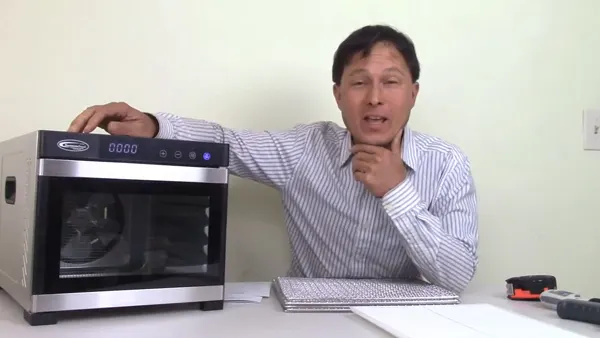
If you’re planning to use a dehydrator overnight, selecting a low-temperature setting is best. This will help preserve the flavor and color of your dried fruit while allowing the dehydration process to occur relatively quickly.
Most dehydrators allow you to set the temperature between 40-45 degrees, so this is an excellent range to aim for. You may also want to consider using a slightly higher temperature setting if you’re looking to speed up the drying process, although this may result in some loss of flavor and color.
Regardless of the temperature, always keep an eye on the fruit to ensure it is drying evenly. Dehydrating fruit is simple but requires patience and careful attention to get the best results.
Can You Run a Dehydrator for Too Long?
While electrical food dehydrators are a great way to preserve your fruits, vegetables, and herbs, running your electric dehydrator for too long is possible. But, if you over-dehydrate your food, it will become brittle and dry, making it difficult to rehydrate.
The key is finding the sweet spot where the food is perfectly dehydrated without overdone. This varies according to your preferences and food types. 4-12 hours of dehydration should be sufficient for fruits and vegetables. Some foods require less time.
Do Overnight Running Dehydrators Cause Fires?
Overnight running dehydrators can be a fire hazard if not properly maintained. Dehydrators work by drawing moisture out of the air, which can raise the temperature inside the unit. If the temperature gets too high, it can cause the dehydrator to overheat and catch fire.
There have been a few reports of fires caused by overnight running dehydrators, but it is unclear whether the dehydrators were defective or were being misused. In most cases, the dehydrators were left unattended for extended periods, likely contributing to the fires.
Any dust particles that builds up on the heating elements can fuel a fire. To reduce the risk of a fire, it is essential to regularly clean the dehydrator and keep it clear of any flammable materials. Also, it is essential to monitor the unit’s temperature and turn it off if it begins to rise too high.
Is a Dehydrator Better than an Oven for Overnight Use?
Ovens are often considered the go-to appliance for dehydrating foods, but dehydrators offer several advantages over ovens, making them the better choice for many people.
For one thing, dehydrators can maintain a constant temperature much more quickly than an oven can. This is important because fluctuating temperatures can cause food to harden outside while remaining moist inside, accelerating spoilage.
A dehydrator typically takes eight to 12 hours to dehydrate food, while an oven can take twice as long. Also, dehydrators use air circulation to dry food, producing lower levels of heat than an oven preserves more of the nutrients in food. This can be beneficial if you are drying delicate foods that high temperatures could damage.
Food dehydrators provide more air circulation than ovens do, which helps to prevent food from becoming stiff and brittle. So if you’re looking for a more efficient and effective way to dehydrate food, a dehydrator is the way to go.
Are Dehydrators Expensive to Run Overnight?
Dehydrators are relatively inexpensive to purchase, and they are also very energy-efficient. Most large dehydrators use about one kWh per hour or less. This means that dehydrators are very affordable to operate, even overnight.
Dehydrators have varying costs depending on their size and the time they are used. Regardless, dehydrators are affordable and can be a useful home food preservation tool.
How to Safely Run a Food Dehydrator Overnight?
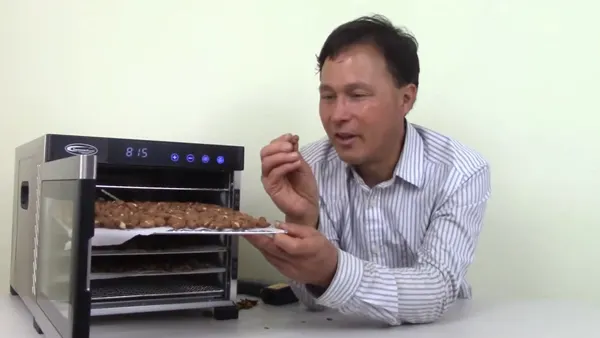
If you’re planning on running your food dehydrator overnight, there are a few things you should keep in mind to ensure the safety of your appliance:
- Place the dehydrator on a level and stable surface. This will help to prevent it from tipping over and potentially causing a fire.
- Don’t forget to unplug the unit before bed. This will prevent fires and save you money on your energy bill.
- If you have pets or small children, keep the dehydrator out of their reach.
- You should plug your dehydrator into a surge protector. This will help prevent any damage from fluctuations in power.
- When the dehydrator is running, remove any loose leaves or twigs that may fall into it.
- If your dehydrator has built-in timer settings, use them to schedule the unit to turn off automatically during the night.
Following these simple guidelines, you can safely and effectively dehydrate large quantities of food overnight.
You Might be Interested:

